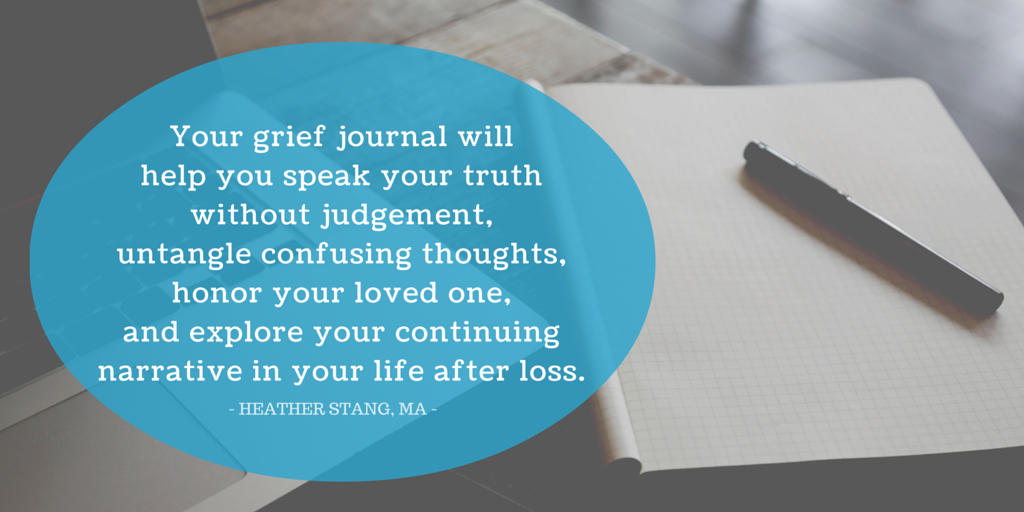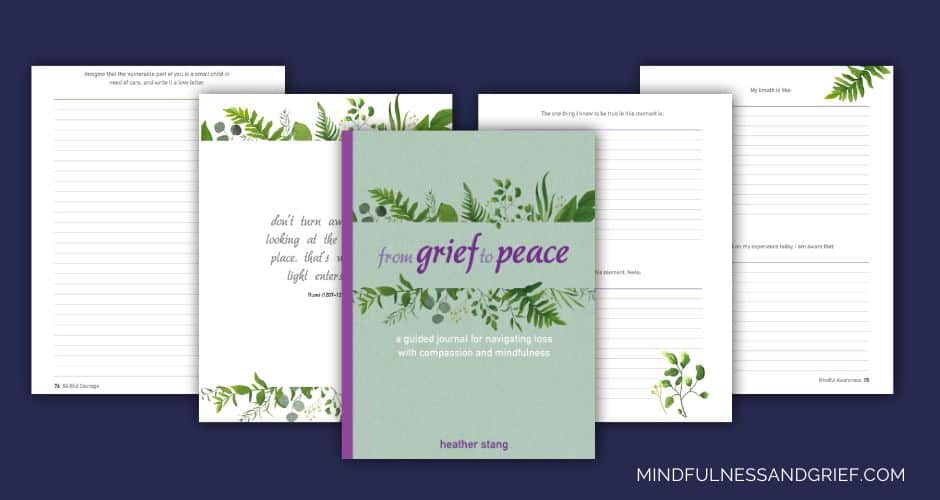When I was about 14 years old I started writing in a journal. I was a grieving child. My mom's brother, uncle Doug, died by suicide when I was just 7, and as I grew older some pretty big questions emerged. My family didn't talk about it much, as you can imagine, so my journal became my confidant. It was a way for me to wrap my head around what had happened, express what I was feeling, and discern who I was becoming in the wake of it all.
Decades later I was asked by my publisher to write From Grief to Peace (June 2021), a guided journal designed to do exactly what the title says. Most people pick up a journal to cope with the pain of loss. But it can also help you honor your love, record memories, and get to know yourself better through the process.
Writing To Process Your Grief
In the book Lessons of Loss: A Guide to Coping , Dr. Robert Niemeyer explains:
"Especially when losses are traumatic, they may be difficult to discuss or even disclose to another. And yet the psychological and physical burden of harboring painful memories without the release of sharing can prove far more destructive in the long run."
There is no shortage of research to show that writing is a good grief tool for a bereaved person. A key principle in grief therapy is that reconstructing your personal narrative is critical for the healing process, and journaling will provide you with a venue for expression without fear of being judged.
Your journal will help you speak your truth without judgement, untangle confusing thoughts, honor your loved one, and explore your continuing narrative in your life after loss.
If it feels right to you, your grief journal can continue your conversation with your loved one after their death. After all, the relationship you have never goes away-the nature of it simply changes. You can ask them questions and imagine their answer. Tell them about what is going wrong, and what is going right.
Styles of Journaling
Free Writing vs. Guided Grief Journal Prompts
Most people associate journaling with freestyle or stream of consciousness writing. This is where you transcribe whatever crosses your mind. No editing. No spellcheck. You don't even need to make sense. You just write.
This gives you a lot of space to write whatever you feel, and can be a great way to record your day to day experience. The downside is that a blank page can seem intimidating, and some people find that writing without direction can lead to a cycle of negative rumination.
One grief journaling study found that directed writing with writing prompts that focused on meaning reconstruction was more helpful than freeform grief journaling that focused on emotion and disclosure. Grieving participants who received the guided grief prompts experienced long-term improvement on prolonged grief disorder, depressive, and post-traumatic stress symptoms. They also saw improvement in physical health.
If you feel paralyzed when writing in a grief journal, or you feel like what you are writing is not serving your needs, writing prompts and guided journals can get you unstuck.
You can write prompts yourself, search for them on the internet, or find a collection in a guided journal for grief like my own From Grief to Peace. Here are a few phrases to get you started:
- I remember when you and I....
- This is what I have to say to you....
- The first time I did _____ without you I....
- My happiest memory of you is...
- The greatest lesson I have learned is...A hybrid approach is also a good choice, combining grief journaling prompts with a traditional journal that affords you the space you need to process the nuanced experience of loss.
The Best Grief Journal for You
Paper Journals
Paper options are plenty. Choose a small notebook or journal that will fit in your purse if you plan to write on the go or tote it back and forth to a counseling or group session. A spiral-bound notebook is a discreet option if you plan on writing at work or want to avoid prying eyes at home. A more formal journal or diary carefully selected in a bookstore or specialty shop can remind us of the significance of our words. There isn't a right or wrong choice.
Consider what you will write with. Any nearby pen or pencil will work, of course, but some writers find that a special pen with the "right feel" helps them get going more quickly. Different-colored writing instruments can help you designate mood or switch back and forth between questions and answers when engaged in dialogue or inquiry.
Don't forget that there are no rules-go beyond prose and add in illustrations, poetry, and even collages and photos if it helps you tell your story and explore your true feelings. You may reserve some of your journal pages to paste photos of special memories, sketch a personification of your mood, or a memory-book style collage.
My first journal was 3-hole-punched, lined notebook paper that I stuck in a folder with brads to hold it together. While it may vary depending on your preferences and lifestyle, a good grief journal will be easy for you to access when you want to record your thoughts. It will also be secure enough for you to confidentially explore a wide range of your feelings.
Remember my notebook paper journal? I wish I could share it with you, but my father found it, yelled at me, and promptly threw it out. It pains me that I cannot reread what adolescent Heather had to say about her uncle's death, and I imagine there was a lot of commentary on family dynamics as well.
I don't say this to scare you off from journaling. It is exactly these types of truths that can be healing when you transpose them from mind to paper. If you are concerned about prying eyes, a password-protected digital journal can come in handy.
Digital Journals
If you prefer journaling on your computer or smartphone, you, too, have plenty of options. Perhaps the simplest solution is an MS Word document on your hard drive. You can always password protect your file for privacy.
AfterTalk.com is my favorite digital solution, which offers a free, secure online grief journal. What you write is for your eyes only, and you also have the option to share select posts with friends, family, or even your therapist with the click of a button.
Additionally, the esteemed grief researcher Dr. Robert Neimeyer hosts the "Ask Dr. Neimeyer " page, which provides a wealth of inspiration and support. You can even ask your own questions about your grief journey.
Tips for Journaling Through Grief
Grief journaling is not about writing perfectly. It is about expression. Here are five tips for writing in your grief journal I explore in the introduction of From Grief to Peace (April 2021):
- There are no right or wrong answers.
- Mindfully engage with your whole being.
- Approach familiar subjects as if it were the first time.
- Walk up to the edge, but don't fall over.
- Seek out physical and emotional support as needed.
- Go through the journal in order. Or don't. (Applicable if you choose a guided grief journal. )
Going Public
Personal blog sites, from Blogger.com to WordPress.org, are great places for journaling. Your content can easily be shared to inspire others, honor your loved one, and connect with loved ones who are also grieving. If you do take your grief journal public, however, consider the pros and cons.
Will your inner critic censor your thoughts in a way that will suppress your authenticity? Many of us struggle with this notion in our private grief journals. Inviting others in may stifle the therapeutic value-or it may help.
You may want to try a hybrid solution. First, write in a private space, and then choose what to share with the public. This approach will both allow you to write with raw honesty, and then choose what to share with the world at large.
Whatever medium you choose, write regularly and write with your whole heart. The healing power of writing can be profound.




